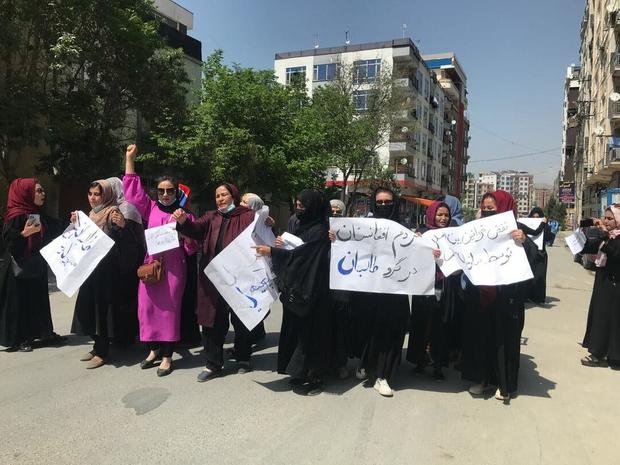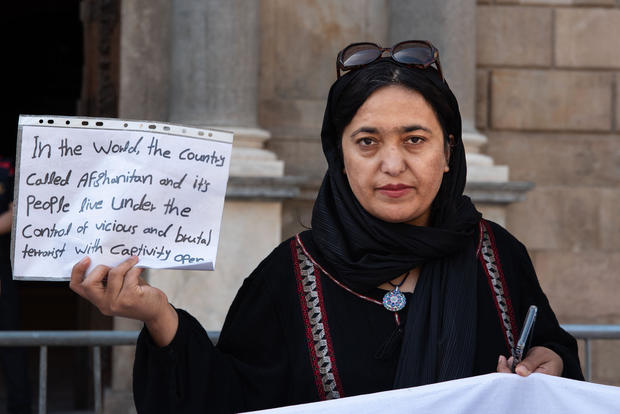Afghanistan’s women protest as U.N. hosts meeting in Doha on “how to engage with the Taliban”
The United Nations kicked off a two-day, closed-door meeting in Qatar on Monday, aimed at helping the international community figure out how to save lives in Afghanistan without bolstering the Islamic hard-liners of the Taliban movement currently in control of the country.
In a statement on Sunday, the U.N. said the meetings’ objective was to “achieve a common understanding within the international community on how to engage with the Taliban” on issues including “human rights, in particular women’s and girls’ rights, inclusive governance, countering terrorism and drug trafficking.”
But even before the meeting in Doha, Qatar got underway, it was the subject of a fierce backlash by Afghan women who see themselves as unrepresented in the talks, and who fear the meetings could lead to something the Taliban has failed to attain since it retook control of Afghanistan when the U.S.-led military coalition pulled out in August 2021: Recognition.
The Taliban has stripped away virtually every basic right that Afghan women had embraced during two decades of Western-backed governance, barring them from most jobs and girls over the age of 12 from school. Their draconian crackdown on basic rights has led to a freezing of millions of dollars in financial assets held in other countries, and not a single other country has recognized the Taliban as the legitimate government of Afghanistan.
The Taliban itself fumed on Monday about being excluded from the talks in Doha, with the head of the regime’s office in Qatar telling CBS News that any meetings without its participation would be “unproductive, and even sometimes counterproductive.”
“How will they implement decisions while we are not part of it? Issues can be solved through pragmatic approach, not one-sided decisions,” said Suhail Shaheen.
But Afghan women who feel their very existence has been erased by the Taliban voiced very different concerns.
Defiant protests in Kabul
U.N. Secretary-General Antonio Guterres was set to convene the meeting on Monday after a weekend of protests against the gathering by the very people its intended to help.
A group of Afghan women, braving the threat of a harsh response from Taliban security forces, took to the streets of Kabul over the weekend to demand their fundamental rights of work and education and to strongly criticize the U.N. for holding discussions they believe could lead to new levels of recognition for the Taliban.
CBS News
The protests, which were mirrored by mostly-women gatherings in Pakistan, the United States and several European nations, saw protesters chanting: “We will fight, we will die to get back our basic rights.”
Clips shared with CBS News of the Saturday protest in Kabul showed one protester addressing Guterres directly, saying: “Antonio Guterres, stop supporting the Taliban. The Doha meeting is a repeated mistake. Recognizing the Taliban is equal to murdering women in Afghanistan.”
“Any attempt to recognize the Taliban is unacceptable to the people of Afghanistan in the current situation,” said another.
Ximena Borrazas/SOPA Images/LightRocket/Getty
Fawzia Koofi, who served as the first female deputy speaker of the Afghan Parliament and worked a peace negotiator with the Taliban, criticized the U.N. for not including women activists in the meeting this week.
“Women are being erased from all social and political process in Afghanistan,” she told CBS News. “We have always campaigned to international agencies to include women meaningfully in all the process, because we believe meaningful inclusion of women will send a strong signal to the Taliban that the world is serious about women and human rights in Afghanistan.”
Why the backlash to the U.N. meeting?
To be clear: The United Nations leadership does not formally recognize the legitimacy of any nation’s government, as that assessment is left to individual member states. The U.N. General Assembly does, however, have a committee made up of representatives from different member states that votes on whether to grant credentials to any party in control of any given member nation.
So far, the nine countries currently sitting on that committee, which include the U.S., China and Russia, have all declined the Taliban’s request for credentials.
In the meantime, the U.N., under the auspices of its many aid an advocacy agencies, has tried to continue carrying out its work in Afghanistan over the last couple years. That work is of particular importance amid the dire humanitarian crisis unfolding under the Taliban regime.
What angered many Afghan women were remarks made on April 19 by Deputy Secretary-General Amina Mohammed, who suggested that some recognition of the Taliban government could be on the table in Doha.
“Out of that [Doha meeting], we hope that we’ll find those baby steps to put us back on the pathway to recognition, [of the Taliban] a principled recognition. Is it possible? I don’t know,” Mohammed told the Princeton Review. “That discussion has to happen… The Taliban clearly want recognition, and that’s the leverage we have.”
The U.N. later walked back her remarks, but the U.N. has stressed that it does intend to keep running its vital humanitarian relief operations in Afghanistan, if possible. After other remarks by U.N. officials suggesting the entire global body could pull out of Afghanistan, many see the two-day meeting in Doha as a way to determine how that work can go forward, despite some very serious challenges.
What’s at stake, and opportunities
Hours before the Doha conference began, the U.N.’s head of humanitarian relief, Martin Griffiths, said doing that life-saving work in Afghanistan required $4.6 billion in international funding for 2023 alone, and “at the moment, we are begging governments to give us the money that we need to do that, because that program is hugely underfunded.”
Afghanistan is at the highest risk of widespread famine in 25 years, but U.N. says it has only managed to collect 5% of the $4.6 billion required. And the funding shortfall isn’t the only challenge.
Last month, the Taliban banned all female U.N. staff from working in the country. The move was condemned in a rare, unanimous vote by the usually-divided U.N. Security Council, showing the high stakes for the Taliban as it seeks global credibility.
“In Doha, the provision of humanitarian assistance will take center stage for the U.N.,” veteran regional analyst Torek Farhadi told CBS News. “The real problem for the U.N. is that it has a serious of shortfalls of funding for its activities in Afghanistan — a failed state under the Taliban’s harsh rule that no country in the world has recognized.”
He said despite the “rare show of common voice [at the U.N. Security council, as] China, Russia, and the United States called on the Taliban to fall in line… the prospects of the Taliban’s recognition as the official government of Afghanistan are dim, and the world community has accepted to live with Afghanistan as a failed and unrecognized state under the Taliban.”
Pakistan’s former Ambassador to Afghanistan and to the U.N., Mansoor Khan, told CBS News that simply abandoning efforts to work with the Taliban would do nothing to improve the situation on the ground for the Afghan people.
“During the past year or so, the gaps in engagement of the Afghan interim government and the international community have increased. This is causing more suffering to the Afghan people, hindering their contacts and connectivity with the world,” Khan said, adding that the Doha talks could provide an opportunity for the various countries taking part “to review the situation and explore steps that can help address some of this isolation in the coming months.”
“I don’t think the Doha conference is about recognition of the Afghan interim government,” Khan stressed. “Recognition is a decision each sovereign country must make on its own. But it’s important to find ways to relax economic sanctions, remove banking restrictions and unfreeze Afghanistan’s foreign exchange assets with a view to convey a signal that the international community wants to assist the Afghan people. But the Afghan interim government also needs to show flexibility and accommodation for responding to the needs and rights of the Afghan people, including education for girls, the working environment for women and inclusive governance.”
CBS News’ Tucker Reals, Sami Yousafzai and Pamela Falk contributed to this report.
For all the latest World News Click Here
For the latest news and updates, follow us on Google News.



